(my drawing - apologies)
(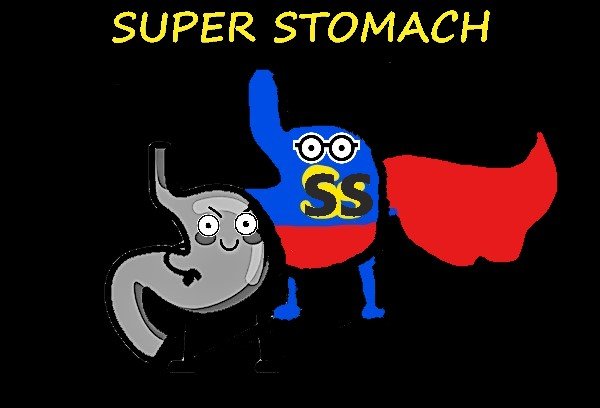 )
)
Your stomach ‘could’ eat you… and so why doesn’t it?
You probably know what stomach acid is (also known as Gastric Acid) - or you've heard of it at least.
It's a term that's thrown around quite often in discussions of health, nutrition, and biology. The way it actually works, on the other hand, is a bit less well known to us in the general population of the world. However, it’s a marvel of science and nature. I’m going to concentrate on the human physiology because – well I’m human (or so it's been reported) but the rules are the same/similar for many mammals, though not all. That I’ll do another day.
The stomach is home to many acids that are formed naturally in the body and these acids pool in the stomach and are used to break down whatever we decided to put into our system via the mouth, from bread to burgers, beansprouts to a good Burgundy. Stomach acid also serves to protect the GI (gastro-intestinal) tract against infection. Heck, not many things can survive that kind of burnout.
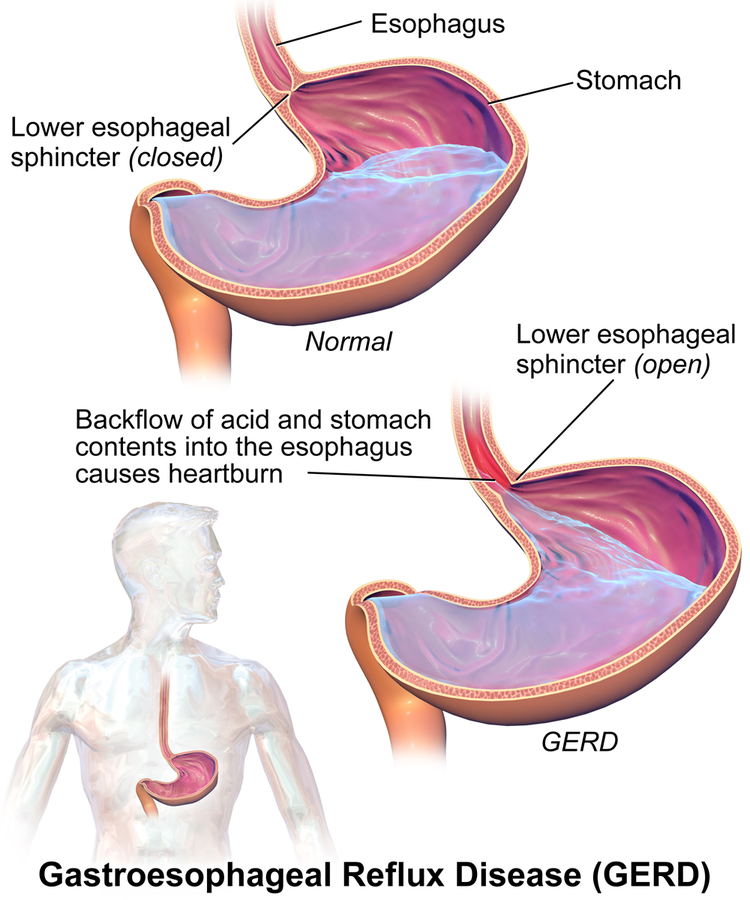
Basic anatomy of the stomach - source
Although stomach acid is important, no imperative to our survival, an excess can result in discomfort and/or more long term damage, and eventually in some case - death.

source
If the liquid firestarter escapes up into the oesophagus, you may experience mild heartburn. It's a little uncomfortable but nothing a peppermint or antacid tablet won't resolve quite quickly.
Excessive acid productions, fatty/spicy foods or a weak sphincter (no that’s not a word just for your bottom hole) and it gets to be major heartburn -which can sometimes be so severe it’s mistaken for a heart attack. You'll feel like you're breathing fire. If you're laying down during an attack it can sometime result in acid being breathed in as it refluxes and you gasp. This can cause other issues such as chest infection/lung infection from burns damage and you WILL need to see a doctor if that happens, especially if it happens a lot.
Recurring or long standing heartburn issues may lead to gastroesophagal reflux disease (a health condition affecting the throat), increased pain from stomach ulcers, Barrett’s Oesophagus and other health issues. This all testifies to the sensitivity of the stomach and the potency of the liquid in there. Here's some information on composition
It’s also a testament to the powers of your body's defensive mechanisms which keep you safe from corrosive gastric acid. In general, stomach acids are not harmful if kept in the right place and absolutely necessary to the body's normal functioning, even though on the outside pure stomach acid will burn your skin.
Stomach Acid and Food
The principal role of stomach acid is to help in the process of digestion. Stomach acid is composed of potassium chloride, hydrochloric acid, and sodium chloride (see link above for more details). This acid is produced by the secretions of a gland in the stomach called the gastric gland. Stomach acid plays an essential and vital role by breaking down the food you eat (or anything else you choose to ingest) so that it can be easily absorbed or disposed of by the rest of the body. Anything not broken down gets passed right on through and is of no nutritional value to the body. Many high-fibre foods, like corn, leafy greens, and certain nuts and grains, often pass through you only partially digested or not at all (ever seen corn kernals in your poop?).
The body may not absorb nutrients from such undigested foods, but they are still valuable/essential to the wellbeing of our intestinal tract. Another post to come.
source
The walls of the stomach are muscular and constantly contract and relax to turn over food in the soup of acids and enzymes which all works together to break down the large food pieces. Think of a liquidizer – big food goes in, mushy food comes out. But if you put crackers in you get crumbs, you need liquid to slime it up a bit. That’s essentially what the stomach muscles do. Their movement excites the acid and food within breaking it all down into mush called chime: a thick liquid which flows into the small intestine for the subsequent stage of digestion.
Stomach acid is critical to this process because, like any natural acid, it is corrosive. If you've ever watched a corrosive acid in action, you have an idea what it can do to solid matter. Natural acid can corrode even a piece of metal. For those unfamiliar with the ph scale, it's a scale that ranges from 0 as the most acidic, to 14, the least. The ph level of stomach acid ranges from 0 to 5. Needless to say, this is incredibly acidic and would be dangerous if ever exposed to skin.
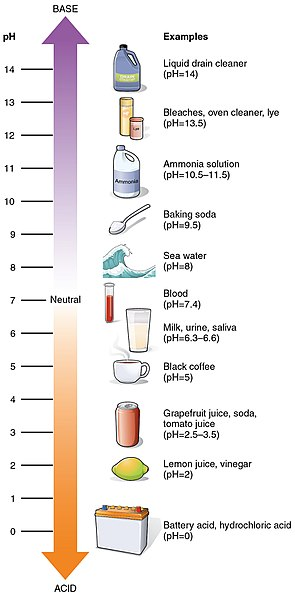 (
(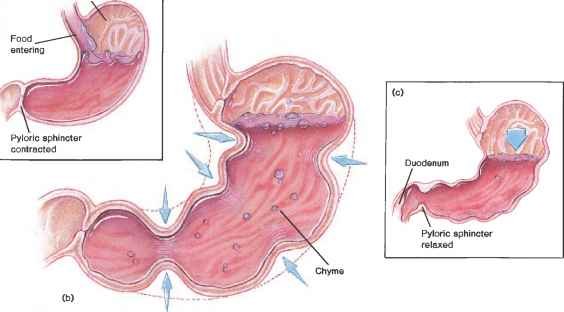 )
)
Stomach Acid is our internal Battery Acid
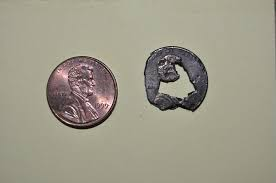
Penny retrieved from stomach of a dog
So how is it safe to have such corrosive stuff in your own body?
Why stomach acid doesn’t harm us?
With such powerful acid in our bodies, you may be wondering how it doesn't corrode our stomachs. This is because of epithelial cells in the stomach. This cell-type produces a solution of bicarbonate and mucous which covers and protects the stomach walls from acid.
The epithelial cell and the mucous form a boundary between the acid and the stomach walls. The bicarbonate functions as a base to neutralize the gastric acid, reducing acidic fluid attack to the walls/lining of the stomach. These protective cells renew around every 4 days so we're always protected... unless...
Unfortunately, some cases arise when this natural system fails to work the way it's supposed to. Sometimes, excess acid is produced in the stomach, causing problems for the body. If the epithelial cell is no longer able to protect the stomach, you may develop what are called gastric ulcers. This can be cause by a bacterial infection called H. pylori bacteria, from the over use of certain drugs including NSAIDs (especially aspirin) or even from diets rich in spices or alcohol. Smokers are apparently more susceptible to getting stomach ulcers too.
more information here
How the stomach secretes these acids – for those who want to know the physiology.
The stomach is capable of producing nearly two litres of gastric acids every day. The secretion process occurs in several different steps. The parietal cells of the cytoplasm form hydrogen and chloride ions. These mix up in the canaliculi. The lumen of the gastric gland then receives the gastric acid which travels to the stomach gradually. The cytoplasm secretes sodium and chloride ions, causing sodium and potassium ions to combine.
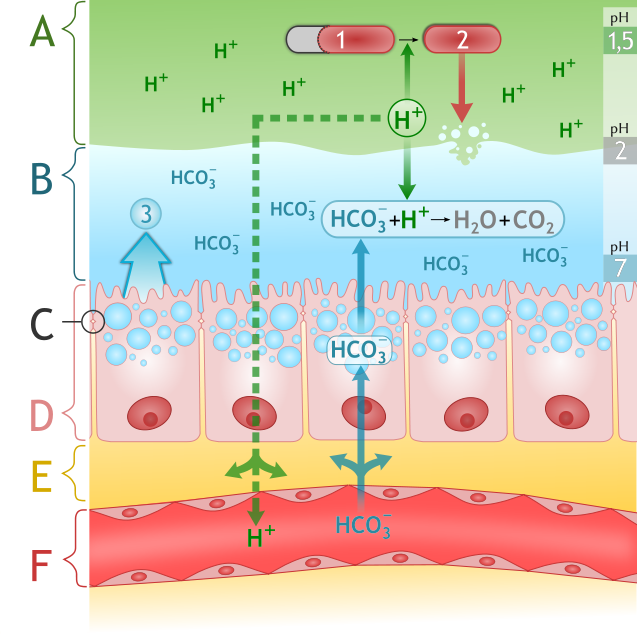
Diagram of alkaline Mucous layer in stomach with mucosal defense mechanisms
Stomach acid and digestion
Interestingly, stomach acid doesn't actually digest the proteins you eat directly. Instead, the gastric acids cause an enzyme, pepsin, to break down proteins into the amino acids which your body eventually absorbs.
Once you eat proteins, your stomach wall will cause a release of a thing called pepsinogen. This substance, mixed with your stomach acid, creates the pepsin that you need for digestion.
Other stages of digestion
As stomach acids are released into the stomach, it produces some chemical reactions that activate the other aspects of digestion located in other organs. The acid's presence will cause the pancreas to generate its own enzymes and fluids, including bicarbonate and lipase. These help neutralize stomach acid and break down some of the proteins and carbohydrates. The presence of gastric acid also activates the muscles which contract the intestines, helping to break down food and move it along to other areas of the digestion tract. Insulin release is triggered ready to counteract the high sugar volume (all carbohydrate foods end up as glucose or waste).
Common heartburn – not to be ignored.
As I have shown, stomach acid can burn if the lower protecting sphincter in the esophagus is not doing its job of keeping the acids out. If the stomach acid does leak out of the stomach heartburn is the initial result and this can be treated often with a simple calcium tablet. However, if the case is especially serious, it can lead to a serious health issue or in very prolonged and serious cases it may trigger cancer cell growth, get into the lungs and corrode lung tissue and the very worst case it can lead to death.
In Conclusion
The stomach and its acids are remarkable. The highly acidic solution churning around in there helps your body thrive by breaking down the food that enters the body for absorption by the rest of your system. It is also responsible for killing off an unfathomable number of nasty bactrerial, viral and fungal invaders that would ensure we were constantly sick or permanently dead if they got past this awesome defence. It is an essential player in human biology, but one that could cause great harm if not for the protective powers of the epithelial cells. It can be a tad scary to think about how your body, without you even noticing, is corroding your food (or anything else you consume) with battery acid and churning it into energy giving liquid ready for absorption. But the human body is a truly sophisticated thing.
There's a link below to GI perforation which adds to the testament of the corrosiveness of liquid we carry with us daily with rarely a thought of how wonderful our bodies actually are.
Until next time, take care of the most important machine you have - your body.
interesting short video
https://www.ncbi.nlm.nih.gov/pubmedhealth/PMH0072488/
https://healthyeating.sfgate.com/role-stomach-acid-digestion-9982.html
https://www.nhs.uk/conditions/stomach-ulcer/
https://en.wikipedia.org/wiki/Gastrointestinal_perforation
Art and health go together quite interestingly. Without energy, the body is not able to produce much of the art that the observer experiences and enjoys so much.
This post has been voted on by the steemstem curation team and voting trail.
There is more to SteemSTEM than just writing posts, check here for some more tips on being a community member. You can also join our discord here to get to know the rest of the community!
Loads of great info here. Thanks for posting.
Great post! I wonder how the peptidase enzymes, which function optimally in acidic pH, discriminate "food" tissue and proteins from the stomach's (and body's) own cells?
wow!! an awesome contribution. These peptidase enzymes cannot differentiate between the protein content of food and the body's own tissue. But the Stomach has a mechanics of preventing the digestion of body tissue. how does it do this?
1- the stomach produces a mucus substance that overlays the inner surface of the stomach. this layer of mucus (alkaline in pH) serve as a barrier between the food and the gastric tissue.
2- the peptidase found in the stomach is Pepsin, and it is first secreted in an inactive form called pepsinogen. this pepsinogen is only activated by the acidic pH of the stomach content and not the stomach itself. therefore an active pepsin is not found in the gastric tissue.
By this the stomach is able to prevent digestion of its tissue.
Thank you for the info. How awesome is our body!?!
In bacterial systems, the host organism produces proteases that recognize a specific amino acid sequence strategically absent from the host's own proteins...analogous to restriction enzymes and methylases. In eukaryotes and higher organisms, it has to be more complicated.
Lots and lots of mucus, localized alkaline microenvironment, and rapid cell regeneration.
THAT is a very good question. If I find the time I'll see what I can find :)